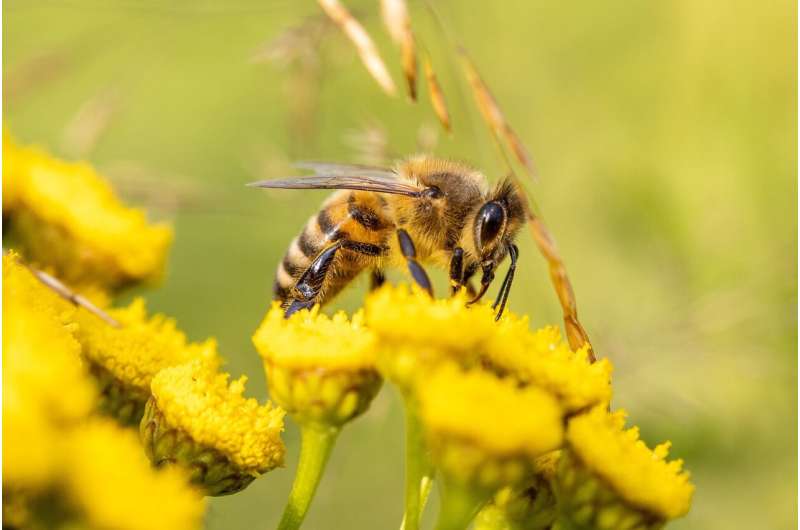
Organic farming and flower strips promote the health of honey bees. In their vicinity, colonies grow stronger and are generally healthier. This is most likely because the insects have a diverse and continuous food supply there and are less exposed to pesticides.
These are the findings of a new study by Martin Luther University Halle-Wittenberg (MLU) and the University of Göttingen, published in the Journal of Applied Ecology. The team analyzed data from 32 bee colonies at 16 locations in Germany with different proportions of organic fields, flower strips and semi-natural habitats.
According to the German Environment Agency (UBA), around half of Germany’s land is used for agriculture. “The way that farmers cultivate their land has a major impact on nature. Intensively farmed fields, pesticides and monocultures pose a threat to many animal and plant species. This is particularly true for pollinators, which include honey bees,” says Professor Robert Paxton, a bee researcher at MLU.
Prominent measures counteracting this development include increasing the proportion of organic farming, planting more flower strips, and creating perennial semi-natural areas near crop fields. “In theory, these measures all make sense. However, we know little about how each of these affect insects, especially honey bees,” continues Paxton.
Therefore, the team from Halle and Göttingen carried out a study at 16 locations in Lower Saxony, Germany. Each of these locations differed in their proportion of organic fields, flower strips and perennial semi-natural habitats.
The researchers placed honey bee colonies at each of the sites and observed these for around a year. They analyzed, for example, colony growth and parasite infestation. Special attention was paid to the varroa mite—a particularly dangerous pest of honey bees which can transmit viruses that are fatal to them.
The data gathered about the bee colonies was then compared. “Organic farming had the greatest impact—the larger the proportion of these areas, the lower the parasite infestation of a colony. This improved colony growth,” explains lead author Patrycja Pluta from MLU.
One reason for this could be that organic farming uses fewer pesticides and, instead, other plant protection measures. Flower strips were also advantageous to honey bees: the number of Varroa mites was lower in areas with a lot of flower strips.
“This could be due to the fact that a diverse and rich food supply strengthens the honey bees’ immune system,” reasons Pluta.
Perennial semi-natural habitats, on the other hand, tended to be disadvantageous, at least for honey bees. Larger areas generally meant a greater infestation of varroa mites. And, unlike flower strips, the areas are not designed to provide an abundant supply of food for honey bees and other pollinators.
“Perennial semi-natural landscapes are an important tool for promoting biodiversity and they serve as a habitat for many animals. Honey bees, that are managed by humans, are the exception,” says Paxton. The findings of the study could help to improve agricultural landscape management for bees and other pollinators.
More information:
Organic farming and annual flower strips reduce parasite prevalence in honey bees and boost colony growth in agricultural landscapes, Journal of Applied Ecology (2024). DOI: 10.1111/1365-2664.14723
Citation:
How does organic farming benefit honey bees? (2024, August 21)
retrieved 21 August 2024
from https://phys.org/news/2024-08-farming-benefit-honey-bees.html
This document is subject to copyright. Apart from any fair dealing for the purpose of private study or research, no
part may be reproduced without the written permission. The content is provided for information purposes only.

